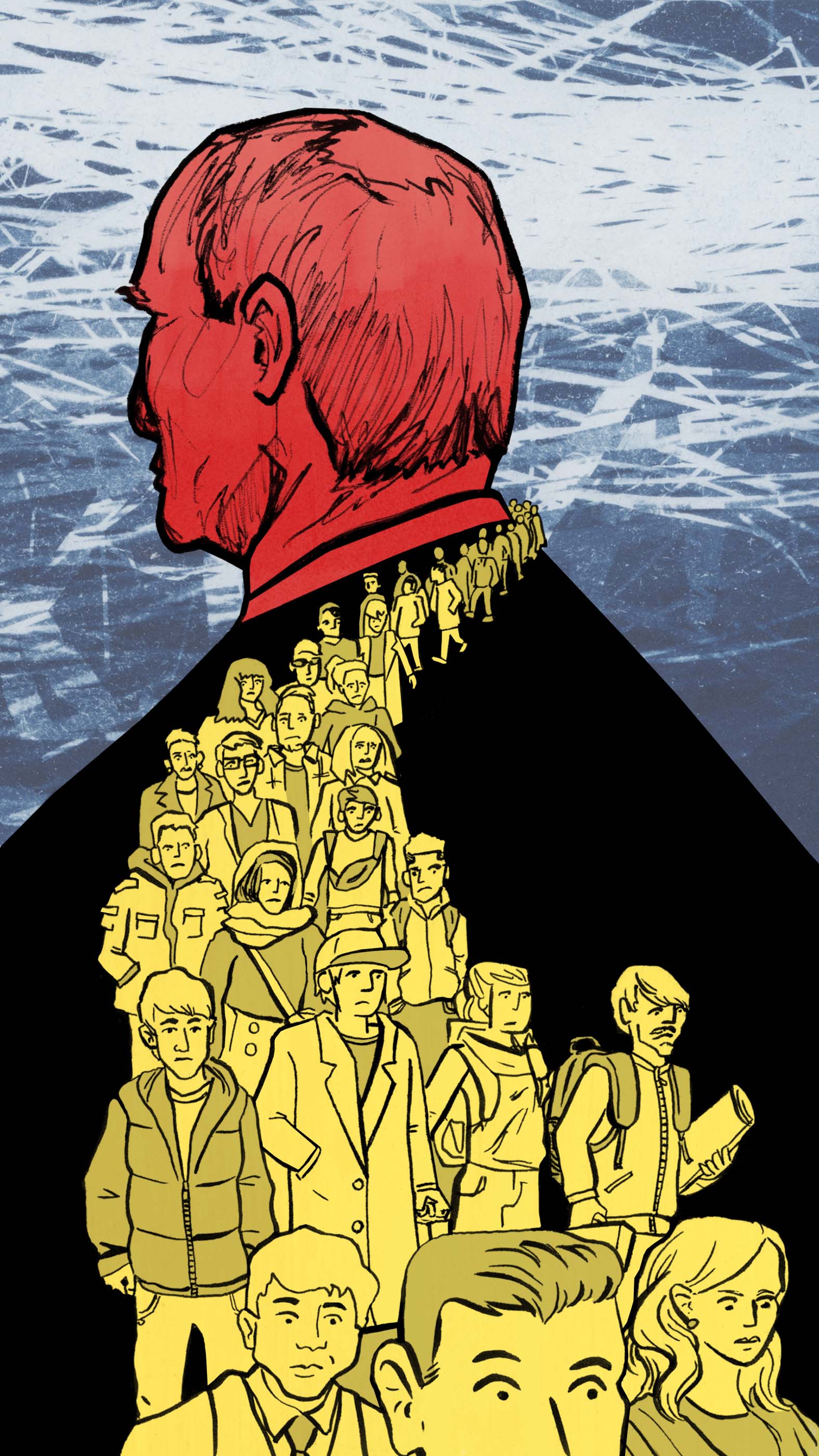The first Russian to win the Nobel Prize in Literature, Ivan Bunin, was unable to do so as a proud representative of his country. Introduced at the Nobel Banquet as “the soul of vanished Russia,” Bunin expressed his gratitude to “the hospitality of France” and to the Nobel Committee for awarding such a prestigious prize “to an exile.” Thirteen years prior, Bolshevik victory in the Russian Civil War had forced Bunin, an impassioned supporter of the anti-Communist White Movement, to leave or face execution if he was discovered on Soviet territory. As a result, he and his wife were forced to live an emigré existence in Paris, joined in the City of Lights by a whole host of Russian writers, artists, philosophers, and other members of the intelligentsia who found themselves in a similar predicament.
Now, exactly one century after the last shots of the Russian Civil War rang out in remote Yakutia, a new warmongering totalitarianism holds court in the Kremlin. Consequently, Russia is witnessing a second Great Emigration—a massive outflow of Russians willing neither to die a pointless death in Eastern Ukraine nor to live and work isolated from the rest of the world. Unlike the first, however, this emigration does not have “creatives” in its vanguard, but rather coders and engineers. The long-term implications of the exodus for Russian economic and social development are nothing short of calamitous.
In the days immediately after the Russian invasion of Ukraine, hundreds of thousands fled Russia. Represented in this initial surge were those who were previously opposed to the regime—and thus feared arrest or maltreatment—and those with non-language-dependent skills who could work remotely, such as IT professionals. One Russian IT trade group, for instance, estimated that the invasion’s first 30 days saw an outflow of up to 70,000 tech workers. A second tide streamed out after the Russian Ministry of Defence announced a partial mobilization in late September 2022. Draft-eligible men with little interest in dying for control of Ukrainian hamlets began fleeing Russia in droves, increasing the emigré total to the high six figures. Hidden beneath both these waves is a steady undercurrent of primarily middle and upper-middle class Russians who can afford to wind down their affairs before emigrating. This persistent trickle is primarily composed of small and mid-sized business owners. Finally, a small number—perhaps 15,000—of Russia’s millionaires have fled, likely to avoid being inadvertently ensnared by Western sanctions. In total, most estimates report that between 800,000 and one million Russians have flooded out of the aggressor state.
Their destinations have been diverse. The most common have been Türkiye, Armenia, Georgia, and Serbia, with these four states accepting 350,000 Russians between them. Many Russians are familiar with Türkiye as a popular and relatively low-cost vacation destination, while Armenia, Georgia, and Serbia share limited cultural and linguistic ties. However, Russian emigrés have been spotted all across the globe, from France to Thailand. Five thousand pregnant Russian women flew as far as Argentina to seek asylum, attracted by guaranteed birthright citizenship and universal free healthcare. Two men even managed to claim asylum in the United States, landing in Alaska after crossing the Bering Strait in a dinghy.

For the vast majority of emigrés, a return to Russia while the war remains ongoing is out of the question. Many could be prosecuted for desertion, and others could find themselves unable to secure housing or work. Some are simply unwilling to work for the gain of an aggressor nation. Consequently, as the war drags on and emigré Russians begin to acclimate to their host nations, the odds of their potential return to Russia become slimmer. Many young Russians are asking themselves a simple question: Why bother returning to an oppressive, autocratic, and increasingly isolated nation if they’ve already made the grand voyage to the West? The dilemma is particularly bothersome for the young, politically-liberal, and highly-employable coders and engineers who made up much of the opening wave. What remains for them in Russia, even in a postwar world?
Not much. Since the most skilled workers have left, so has much of the expertise required for meaningful innovation. And if innovation has fled Russia, emigrés have even less incentive to return. This hemorrhaging of human capital, commonly termed “brain drain,” will saddle Russia’s next generation of young professionals with an even more barren domestic economic environment and contribute to new outflows.
To forestall this calamity, the Russian State Duma has begun debating a package of incentives designed to coax back emigrés. President Vladimir Putin, however, has publicly called those who have left Russia since the beginning of the war “traitors” and “scum.” Such messaging is unlikely to be effective in bringing back young Russians at the top of their fields—particularly as the Russian government has a long history of reneging on its promises to its own citizens.
Some theorists have argued that brain drain can be stemmed by pressuring developed states to adopt stringent immigration policies and invest directly into the developing world. If young professionals find emigration to the West legally difficult and see the construction of cutting-edge facilities in their home nations, they may decide to stay. But in Russia’s case, the West has little incentive to cooperate. From a geopolitical perspective, every young AI engineer and hacker that the United States can woo from Moscow to Fort Meade is a win in the zero-sum world of great power competition. Few nations in the world are willing to turn their noses up at skilled workers able to jumpstart domestic tech industries. Any question of foreign direct investment into Russia is surely moot—at least unless Putin’s grip on Russia is broken and the country regains a semblance of democratic freedoms.
In a nation already experiencing a severe demographic crisis—with a population that has decreased every year since 2017 and the third-lowest life expectancy in Europe—an outflow of a million predominantly young people is likely to set an irreversible course for ruin. A dearth of young people compels the remaining labor force to work harder to support the elderly, which in turn reduces the resources the young have to start families. This is the destructive population trap currently on display in East Asia. As with brain drain, there is no easy cure.
Putin’s futile war thus has the potential not only to bury Russia’s immediate future under a mountain of corpses but also to permanently stunt the economy of Europe’s largest nation and exacerbate an already existing and deeply intractable population crisis.
When lists of the greatest Russian literature of the 20th century are compiled, authors like Nabokov, Brodsky, Pasternak, Solzhenitsyn, and Bulgakov are prominently featured. These authors, all either pre-Soviet emigrés, Soviet deportees, or domestically disfavored dissidents, have one thing in common—they could never be positively associated with the Soviet regime. In this way, the government ensured that it could never lay symbolic claim to some of the greatest artistic and aesthetic achievements that the 20th century was blessed to witness.
Now, in the 21st century, Russia is well on its way to repeating its old mistakes. This time, however, Putin’s bloodthirsty regime has not been content with banishing creative merit—it has managed to drive out an entire generation of talented coders, businesspeople, and engineers. Factories can be restaffed and companies rebuilt, but Russia will see no meaningful innovation or progress if its best and brightest move overseas. When the war ends, Russia may find itself economically, socially, and politically desolate.
Perhaps, in an echo of what came before, some of the greatest technological achievements of this century will be credited to geniuses with Russian surnames. But, as with Ivan Bunin, many of them may be forced to begin their orations with messages of gratitude to their adopted homelands and acknowledgments of their immigration status—exiles, fleeing from a criminal regime.
